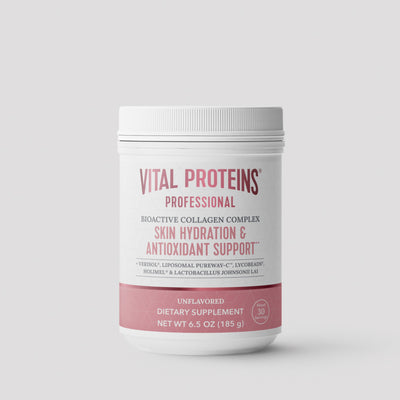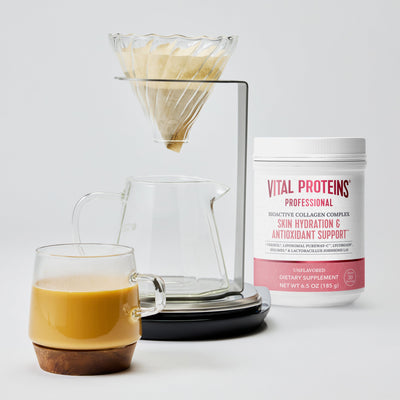Olivia Peláez, MS, FMCHC, is our in-house Functional Nutritionist and Sr. Training & Education Program Manager.
Collagen is the most abundant protein in the body and responsible for supporting the health and integrity of our body’s tissues, especially in our muscles, tendons, bones, joints and skin.
Unfortunately, as we age, our body’s endogenous (or our body’s own internal) production begins to decline. This paired with the fact that most people are not consuming a collagen-rich diet can contribute to signs of aging - think less joint mobility and flexibility, fine lines, wrinkles and decreased skin hydration and elasticity. Another underlying root of this issue, specifically in women, can be estrogen declines as a result of menopause.
Below, you’ll find everything you need to know about the connection is between collagen production and estrogen levels in the body.
What is estrogen and its role in the female body?
Estrogen is a hormone secreted by the ovaries that has many functions in the biological female body. It helps develop and maintain the reproductive system and female characteristics. During reproductive ages, estrogen regulates the menstrual cycle. Levels of estrogen rise as one reaches puberty and surge monthly as the uterine lining prepares for fertilization. Beyond that, estrogen plays roles throughout the body, protecting the heart, brain, muscle and bone, enhancing mood and supporting full and taut skin. With age, estrogen levels decline, leading to menopause, marking the end of the reproductive years and the beginning of the deterioration of various parts of the body.

What’s the connection between estrogen and skin?
The role of estrogen in supporting the skin is significant. Skin density, hydration and elasticity are supported by estrogen and are lessened with the decline in estrogen availability.
If you recall from high school anatomy class, the skin is the largest organ in the body. Skin helps in body protection and temperature regulation and acts as an organ of sensation. Like all other tissues, it undergoes degenerative processes with aging. Skin aging includes a loss of elasticity, a reduction in epidermal thickness and collagen content, elastic fiber degeneration, and increased wrinkling and dryness. The protective functions of the skin become compromised, and thus aging is associated with impaired wound healing and skin cancer.
So what does that have to do with estrogen? Estrogen induces collagen synthesis via the proliferation of dermal fibroblasts and reduces collagen breakdown by altering the expression and activity of enzymes called matrix metallo proteinases (MMPs). MMPs are produced at higher levels when estrogen levels decline. Upon menopause, estrogen deficiency leads to skin atrophy and accelerated aging. It is estimated that each year after menopause, skin thickness is reduced by ~1% and collagen content is reduced by 2 percent. In addition to reduced production of collagen, the collagen in the skin becomes sparse, thickened and increasingly disorganized. The breakdown of collagen is a marker of aging that results in a decrease in the tension of skin and leads to wrinkles.
But unfortunately, it doesn’t stop there. Estrogen also plays a role in skin hydration and elasticity. The moisture content of skin gives it plumpness and makes it soft to the touch. Estrogen helps retain and restore skin moisture through several ways. These include increasing the presence of hyaluronic acid, supporting higher sebum levels and promoting the water-retaining capacity of the stratum corneum, the outermost layer of the skin. The water-holding capacity of the dermis is attributable to the presence of very ‘water-loving’ molecules such as hyaluronic acid. In women, sebaceous gland activity gradually declines after menopause, explaining the desire to use increasing amounts of topical creams and serums.
Skin elasticity declines with age and fluctuates with cyclic hormonal levels. The protein elastin allows the skin to rebound upon stretching. More specifically, estrogen appears to support production of elastin and there’s a visible reduction in skin elasticity when estrogen levels fall.
Introducing Vital Proteins® Professional Skin Hydration & Antioxidant Support**
One of my personal favorite products, Bioactive Collagen Complex Skin Hydration and Antioxidant Support** includes Verisol®which contains specific peptides that stimulate fibroblast cells in the dermal layer of skin to increase their collagen metabolism and counterbalance the collagen degradation in the dermis. Verisol® reduces appearance of fine lines and wrinkles** and boosts skin elasticity**. In addition to Verisol®, this standout product is made with other skin-supporting functional ingredients like hyaluronic acid, vitamin C and three ingredients that have been clinically-studied and found to help ward off environmental threats to skin.**
One of these is aresearch-backed, patented melon extract called HOLIMEL™ that is rich in antioxidants that bolster our skin’s resistance to environmental stress.** Then, there’s an extract from unique tomatoes called LYCOBEADS®. It’s also rich in antioxidants—especially one known as lycopene. Like HOLIMEL™, LYCOBEADS® aids our skin’s natural resilience to external stressors.** Also included in the formulation is a probiotic—Lactobaccilus johnsonii, LA1. The probiotic (and both of the plant extracts) were each studied separately in people exposed to UV light. Theresearch found that people that took any of these three things, HOLIMEL®, LYCOBEADS®, or Lactobaccilus johnsonii, LA1, were able to tolerate more UV light before their skin started to redden.**
(Just remember, taking the product doesn’t take the place of regularsun protection, such as hats and sunscreen.)
















